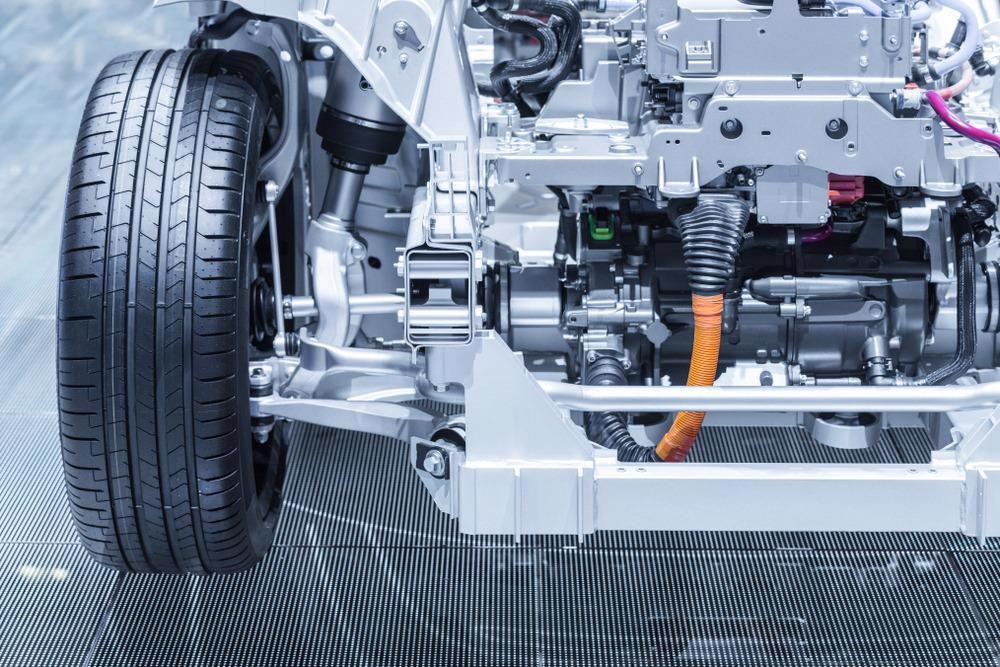
Image Credit: Sergii Chernov/Shutterstock.com
Innovative solutions are needed for society to achieve climate emission targets, and fuel cell propulsion systems for vehicles are helping to drive the automotive industry’s green revolution.
Current State of the Automotive Industry
Transportation alone makes a significant contribution to greenhouse gas emissions. In the US alone, 2018 figures from the EPA showed that the transportation sector accounted for 28% of greenhouse gas emissions. Many other harmful gases are released, including nitrous oxide. Short-term exposure causes a plethora of respiratory problems, and it is one of the leading causes of pollution in cities.
The use of fossil fuels as a power source is problematic. Aside from the emission of harmful greenhouse gases and pollution, fossil fuels are a finite resource. Estimates of when oil will run out vary, but it is widely agreed that we need to reduce our fossil fuel consumption. One sector which is well-placed to help achieve net-zero carbon emissions and consumption is the automotive industry.
The Growth of Electric Vehicles (EVs)
Electric and low-emission vehicle technology is growing fast as a viable alternative to the internal combustion engine. In 2019, global sales of electric cars reached more than 2.1 million, boosting the total amount to 7.2 million. This was 2.6% of global car sales and a total of approximately 1% of all global car stock, a 40% year-on-year increase.
Worldwide, governments are implementing plans to achieve net-zero carbon emissions and meet the targets set out in the Paris Climate Agreement. The UK has announced plans to phase out new diesel and petrol vehicle sales by 2030, with all cars and vans entirely zero emission at the tailpipe by 2035.
The UK government has earmarked a total of £1.8 billion of funding to support greater uptake of zero-emission vehicles, including installing more charge points nationwide and green innovation. Greener cities are being envisioned by banning non-zero emission cars from certain areas and increasing pedestrianization and public transport.
There is a need for the automotive industry to stay relevant in a changing world. One of the key technologies driving this change is the development of electric powertrains. One problem with powertrains is in providing similar power to internal combustion engines. Recent developments in the sector include the rise of fuel cell propulsion systems, which use hydrogen generation for their power needs.
Blue World Technology’s Methanol Fuel Cell Solutions
One promising fuel being explored is methanol. This abundant green fuel can provide similar power solutions and convenience as using petrol in an internal combustion engine. One company developing technology with methanol fuel cell components is Blue World Technology, and they are working in conjunction with Karma Automotive.
Blue World Technology’s innovative solution uses a methanol-reformer to produce hydrogen onboard the vehicle. Methanol reformers produce hydrogen for fuel by reacting a mixture of methanol and steam. This is carried out by heat and pressure and interaction with a catalyst. Methanol can be stored as a liquid, which is logistically more sound and safer than storing pressurized hydrogen.
Blue World has used decades of experience to produce a cell system with zero harmful emissions and a low overall well-wheel CO2 emission level. Renewable methanol can be manufactured from many sources, including biomass, municipal waste, and biogas. The methanol fuel cell systems are combined with batteries in hybrid configurations, and smart control units govern the system and communicate with the vehicle.
The technology is currently being integrated with Karma’s electric vehicle architecture and being piloted in their GS-6 development vehicles. It will be tested and evaluated in Denmark and the US over the next few months.
Integrating Fuel Cell Expertise and Hybrid Vehicle Know-How
With this collaboration, Blue World’s strength in fuel cell development and Karma’s expertise in engineering hybrid propulsion systems are brought together in one vehicle. Formed in 2014, Karma sells its luxury EVs through 40 dealerships across the US, Canada, Middle East, and Europe.
By integrating Blue World’s methanol fuel cell propulsion systems into Karma’s future models, the technology promises to deliver a real boost to their power and range. The future is bright for both companies.
Methanol Fuel Cells: The Future?
With collaborations such as these, the green future of the industry is looking more viable. Fuel cell production is of particular interest to a variety of manufacturers looking for viable solutions to the suitability of EVs for long journeys.
With Blue World Technology’s innovative methanol fuel cell components, Karma Automotive’s luxury EVs may lead the way for the next phase of electric vehicle and hybrid rollout. Net-zero emissions for the industry as a whole are within reach.
References and Further Reading
Karma Automotive (2021) Karma Automotive and Blue World Technologies to Collaborate on Fuel Cell Propulsion System [Online] Available at: https://www.karmanewsroom.com/news/karma-automotive-and-blue-world-technologies-to-collaborate-on-fuel-cell-propulsion-system/ (Accessed 13 February 2021).
Blue World Technologies. Methanol Fuel Cells. [Online] https://www.blue.world/ (Accessed 13 February 2021).
IEA.org. (2020) Global EV Outlook 2020 [Online] Available at: https://www.iea.org/reports/global-ev-outlook-2020 (Accessed 13 February 2021).
EPA.gov. Sources of Greenhouse Gas Emissions, Transportation Sector. [Online] Available at: https://www.epa.gov/ghgemissions/sources-greenhouse-gas-emissions (Accessed 13 February 2021).
Gov.uk. (2020) Government takes historic step towards net-zero with end of sale of new petrol and diesel cars by 2030. [Online] Available at: https://www.gov.uk/government/news/government-takes-historic-step-towards-net-zero-with-end-of-sale-of-new-petrol-and-diesel-cars-by-2030 (Accessed 13 February 2021).
Disclaimer: The views expressed here are those of the author expressed in their private capacity and do not necessarily represent the views of AZoM.com Limited T/A AZoNetwork the owner and operator of this website. This disclaimer forms part of the Terms and conditions of use of this website.